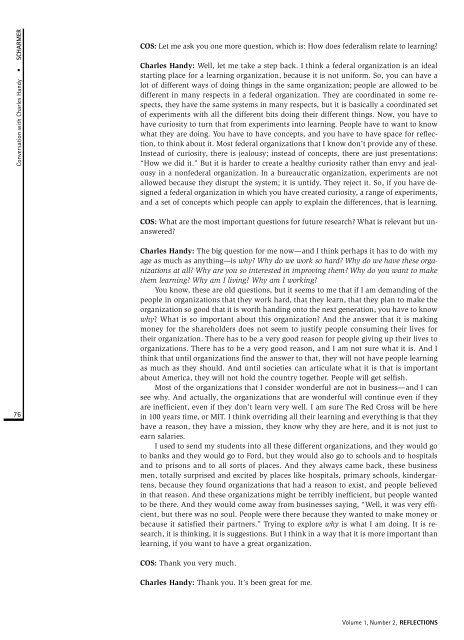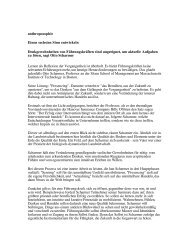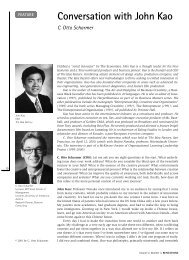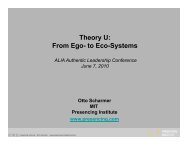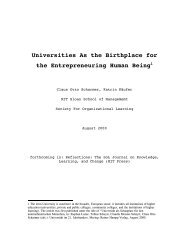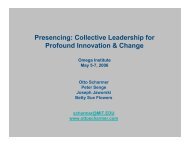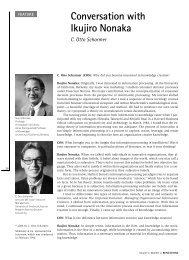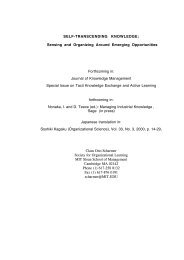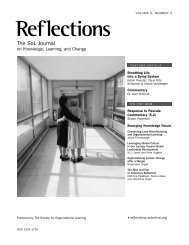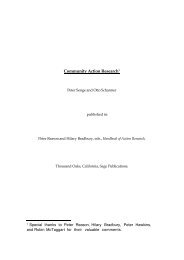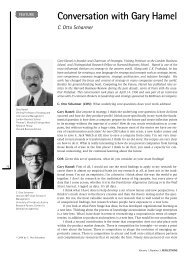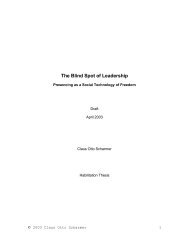Conversation with Charles Handy - Otto Scharmer
Conversation with Charles Handy - Otto Scharmer
Conversation with Charles Handy - Otto Scharmer
You also want an ePaper? Increase the reach of your titles
YUMPU automatically turns print PDFs into web optimized ePapers that Google loves.
<strong>Conversation</strong> <strong>with</strong> <strong>Charles</strong> <strong>Handy</strong> SCHARMERCOS: Let me ask you one more question, which is: How does federalism relate to learning?<strong>Charles</strong> <strong>Handy</strong>: Well, let me take a step back. I think a federal organization is an idealstarting place for a learning organization, because it is not uniform. So, you can have alot of different ways of doing things in the same organization; people are allowed to bedifferent in many respects in a federal organization. They are coordinated in some respects,they have the same systems in many respects, but it is basically a coordinated setof experiments <strong>with</strong> all the different bits doing their different things. Now, you have tohave curiosity to turn that from experiments into learning. People have to want to knowwhat they are doing. You have to have concepts, and you have to have space for reflection,to think about it. Most federal organizations that I know don’t provide any of these.Instead of curiosity, there is jealousy; instead of concepts, there are just presentations:“How we did it.” But it is harder to create a healthy curiosity rather than envy and jealousyin a nonfederal organization. In a bureaucratic organization, experiments are notallowed because they disrupt the system; it is untidy. They reject it. So, if you have designeda federal organization in which you have created curiosity, a range of experiments,and a set of concepts which people can apply to explain the differences, that is learning.COS: What are the most important questions for future research? What is relevant but unanswered?76<strong>Charles</strong> <strong>Handy</strong>: The big question for me now—and I think perhaps it has to do <strong>with</strong> myage as much as anything—is why? Why do we work so hard? Why do we have these organizationsat all? Why are you so interested in improving them? Why do you want to makethem learning? Why am I living? Why am I working?You know, these are old questions, but it seems to me that if I am demanding of thepeople in organizations that they work hard, that they learn, that they plan to make theorganization so good that it is worth handing onto the next generation, you have to knowwhy? What is so important about this organization? And the answer that it is makingmoney for the shareholders does not seem to justify people consuming their lives fortheir organization. There has to be a very good reason for people giving up their lives toorganizations. There has to be a very good reason, and I am not sure what it is. And Ithink that until organizations find the answer to that, they will not have people learningas much as they should. And until societies can articulate what it is that is importantabout America, they will not hold the country together. People will get selfish.Most of the organizations that I consider wonderful are not in business—and I cansee why. And actually, the organizations that are wonderful will continue even if theyare inefficient, even if they don’t learn very well. I am sure The Red Cross will be herein 100 years time, or MIT. I think overriding all their learning and everything is that theyhave a reason, they have a mission, they know why they are here, and it is not just toearn salaries.I used to send my students into all these different organizations, and they would goto banks and they would go to Ford, but they would also go to schools and to hospitalsand to prisons and to all sorts of places. And they always came back, these businessmen, totally surprised and excited by places like hospitals, primary schools, kindergartens,because they found organizations that had a reason to exist, and people believedin that reason. And these organizations might be terribly inefficient, but people wantedto be there. And they would come away from businesses saying, “Well, it was very efficient,but there was no soul. People were there because they wanted to make money orbecause it satisfied their partners.” Trying to explore why is what I am doing. It is research,it is thinking, it is suggestions. But I think in a way that it is more important thanlearning, if you want to have a great organization.COS: Thank you very much.<strong>Charles</strong> <strong>Handy</strong>: Thank you. It’s been great for me.Volume 1, Number 2, REFLECTIONS


